OIDI February Newsletter

The Miami Pulse
Connecting, Assessing, and Moving Forward our Inclusive Community
February 2023 Edition

Land Acknowledgement
Miami University is located within the traditional homelands of the Myaamia and Shawnee people, who along with other indigenous groups ceded these lands to the United States in the first Treaty of Greenville in 1795. The Miami people, whose name our university carries, were forcibly removed from these homelands in 1846.
In 1972, a relationship between Miami University and the Miami Tribe of Oklahoma began and evolved into a reciprocal partnership, including the creation of the Myaamia Center at Miami University in 2001. The work of the Myaamia Center serves the Miami Tribe community and is dedicated to the revitalization of Miami language and culture and to restoring that knowledge to the Myaamia people.
Miami University and the Miami Tribe are proud of this work and of the more than 140 Myaamia students who have attended Miami since 1991 through the Myaamia Heritage Award Program.
Letter from the Vice President for Institutional Diversity and Inclusion
Greetings Miamians!
As we begin the Spring semester, we are excited to share with you this edition of the Office for Institutional Diversity and Inclusion’s (OIDI) quarterly newsletter. At our annual Dr. Martin Luther King Jr. commemoration, in her powerful speech on “I Dare You To Be The Dream!” Dr. Carolyn Jefferson-Jenkins reminded us of the importance of putting words into action in the service of transformative change and justice, and of not limiting those efforts to one day, week, or month. We echo Dr. Jefferson-Jenkins’ call to action, and encourage all Miamians to individually and collectively work towards a more inclusive community for all.
One key opportunity to have your voice be heard and inform future actions in our efforts to be a more fully inclusive community is through participation in our climate survey, from January 25- March 1. We need to hear from as many students, faculty, and staff members as possible to better understand the range of experiences and needs within our community, so that we can continue to develop needed initiatives, programming, and strategies. Please take a moment to complete the survey. The data we collect will help inform our strategic planning, including the development of Miami’s upcoming first DEI Strategic Plan. You will also have the opportunity to win a variety of prizes.
As part of Miami's efforts to promote and sustain an inclusive community, we are also excited to announce that Miami students, faculty, and staff now have access to NameCoach. Names are central aspects of our identities, and correctly pronouncing each name contributes to inclusion and belonging. This tool allows students, as well as faculty and stafff, to record the correct pronunciation of their names and include that pronunciation on their Canvas profile and email signatures. NameCoach is integrated with Canvas, so all instructors can know the pronunciation of students' names.
In this edition, we invite Miamians to learn about the collaborative efforts of faculty, staff, and students to bring to life The Lived Experiences Project. This impressive oral history project chronicles the stories of people of color in the Miami community from the 1940s to the 2000s. It encourages us to reflect on and engage with these experiences as we move forward.
This edition also features Patti Liberatore, Director of the Performing Art Series, who shares more about efforts in the College of Creative Arts to organize and support the Black Arts Initiative. You’ll also learn about the student advocacy efforts behind the ASG’s Menstrual Justice Initiative, and about the great DEI discussions and programming happening in IT Services as well as about recent national recognition for these efforts.
Miami faculty continue to publish timely and meaningful work that advances our knowledge on a range of DEI topics, from BlackBoyCrit pedagogy to social justice education to race-based mascots to race in physics. Check out the Research Insights section to learn more and link to some of this exciting recent research. Please also continue to send in information on your publications so we can feature them in future editions.
Finally, as you scroll down, check out our new Cultural Resource Guide, learn more about the activities being organized by Miami’s affinity groups, and mark your calendars for planned events for Black History Month, Women’s History Month, and National Deaf History Month. If you haven’t already, we invite you to read more about and mark your calendar for the Across the Divide Conference on March 31, which will feature a keynote on “I Had No Idea You Were Black: Navigating Race on the Road to Leadership,” by Dr. Ron Crutcher.
As always, we welcome your feedback and suggestions and invite you to reach out to OIDI staff. Thank you for all you do to reflect and advance Miami’s commitment to an inclusive community.
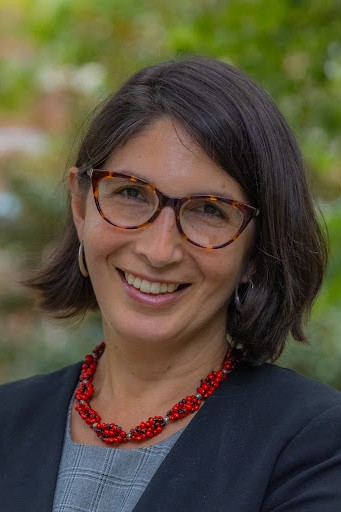
Love and Honor,
M. Cristina Alcalde, Ph.D. (she/her/hers)
Vice President for Institutional Diversity and Inclusion
Professor, Global and Intercultural Studies
vpDiversity@MiamiOH.edu
Heritage Month Updates
Working in close collaboration with faculty, staff, and student partners, the Office of Institutional Diversity and Inclusion provides opportunities for the Miami community to continue our learning and engage in meaningful programming that recognizes, examines, and values historical legacies of a diverse array of identities. Heritage Month programming supports Miami’s inclusive excellence and DEI mission and connects to, among other areas, DEI Task Force Recommendation, Pillar 2: Cultural Consciousness, which encourages the Miami University community to enhance our awareness, knowledge, and skills to enrich and renew our intercultural competence.
The Office of Institutional Diversity and Inclusion will organize programming, and collaborate, coordinate, and support events across campuses through a coordinated calendar for each month; promotion of events; and, when available, limited funding support for proposed events with appeal across campuses.
MU Libraries is partnering with OIDI to feature online resources, including films, books and articles, and class offerings, during each Heritage Month. We invite you to explore these and other educational resources and links on each webpage. We will be adding resources as they become available.
To learn more about this quarter’s heritage months please visit our Heritage Month webpage:
History Month Events Submissions
Now Accepting Submissions for History Month events and programming for Spring semester. Working in close collaboration with faculty, staff, and student partners, the Office of Institutional Diversity and Inclusion provides opportunities for the Miami community to continue our learning and engage in meaningful programming that recognizes, examines, and values historical legacies of a diverse array of identities. Heritage Month programming supports Miami’s inclusive excellence and DEI mission and connects to, among other areas, DEI Task Force Pillar 2: Cultural Consciousness, which encourages the Miami University community to enhance our awareness, knowledge, and skills to enrich and renew our intercultural competence. Submit your proposal considering priority deadlines for each proposed history and heritage month celebrations.
Affinity Group Updates
Asian/Asian American Faculty Staff Association
President: April Robles, Director of Operations and Communications
The mission of the Asian/Asian American Faculty Staff Association is to bring together Asian and Asian American faculty and staff, and serve as a supportive community for Asian and Asian American employees and students. The Asian/Asian American Faculty Staff Association is currently building traction with the community and is seeking to provide opportunities for individuals to connect in a more casual atmosphere and then use that leverage to continue the growth and momentum of the group. If you are looking to make an impact and be a leader, this is the group for faculty and staff to join! If it is a personal passion and something they want to do to become more connected to the campus community, you are encouraged to reach out to April Robles to connect.
Association of Black Faculty and Staff
President: Seth Seward, Assistant Director, Alumni Relations
The Association of Black Faculty and Staff stands for diversity, equality, solidarity, and change for campus at large, students, and the Oxford community. As an organization, they will engage and participate in any efforts that are meant to educate and provide clarity of ideas of ending racism and discrimination. The Association of Black Faculty and Staff serves as a safe place for African American or black individuals to come together and meet. This is accomplished through general body meetings and social events. If something arises on campus that impacts the community, they gather together to discuss and hash out solutions in a safe space. The group also works to serve as a support system and network for students, staff, and faculty. While there are no current community events planned, anyone interested in becoming a member is encouraged to complete the membership formstack to connect.
Association of Latinx Faculty and Staff
President: José Amador, Associate Professor, Global and Intercultural Studies (Latin American, Latino/a, and Caribbean Studies)
The primary goal of the Association of Latinx Faculty and Staff primary is to support and raise awareness about the Latinx faculty and staff. They aim to build networks between departments and units, faculty and students, and Miami university and the community at large. The group also strives to raise the visibility of the Latin American Studies Program and the nearby Latinx community. Additionally, to keep everyone informed about everything Latinx-related, which is done through a weekly “bulletin” with news and events. This organization has been formed by employees of Miami University (Hamilton, Middletown, and Oxford campuses) to foster Latinx, Latin American and Caribbean, and Ibero, Luso-American representation, improve work conditions, and enrich the social and cultural environment for all Miami faculty, staff, and students. Individuals interested in connecting can reach out to José Amador.
Classified Personnel Advisory Committee
President: Angela Coffey Brown, Administrative Assistant, Enrollment Management and Student Success
The Classified Personnel Advisory Committee is established for the purpose of advising the President, Vice Presidents, and Human Resources on matters of interest and concern to classified staff members in the context of the whole university community. The group accomplishes this by bringing issues/concerns/proposals to administration for input and/or action, serving (individual members) on university committees, and providing feedback/input on matters brought to the committee for review. Additionally, the Classified Personnel Advisory Committee is established to provide an institutional venue or forum in which matters of interest or concern to classified staff members can be discussed, considered, and/or moved forward through appropriate channels. Anyone interested in connecting with or joining the committee can contact Angela Coffey Brown or reach out to the CPAC email.
International Faculty and Staff Association
President: Jacqueline Rioja Velarde, Associate Director of the Global Initiatives' CAWC
The goal of the International Faculty and Staff Association at Miami is to support and connect international faculty and staff while helping each other thrive in their specific roles on campus. This is accomplished through connecting with colleagues from diverse cultural, ethnic, racial, linguistic, and educational backgrounds, and broadening perspectives, welcoming diversity, and experiencing inclusion at Miami. The group also seeks to listen, understand, and identify the needs of international faculty/staff, address the concerns and needs of the university, provide relevant resources as needed, and help international faculty/staff. The main goal of the group is to support one another in professional development at the university.
IFSAM recently had a change in leadership. The new president for the group is Jacqueline Rioja Velarde. Jacque is the Associate Director of the Global Initiatives’ CAWC. She joined Miami University in 2003 as faculty in Geography and the Latin American Studies Program, and the CAWC in 2006. She initiated her career in higher education at the Pontifical Catholic University of Peru -PUCP. She earned her B.A. in Humanities & B.Ed. in Social Sciences from the PUCP; and her M.A. in Geography from Syracuse University. Practitioner of Global education co-curriculum development with a focus on DEI & social justice pedagogy; intercultural communications; and ICQ Global DISC™.
The group also has a newly appointed communications chair, Ebru Dirsel-Duffield. Ebru has been teaching in the ACE (American Culture and English) Program since 2013. She earned her doctoral degree in TESL (Teaching English as a Second Language) at the University of Cincinnati. Her research interests include ESL teacher education, non-native English speakers, second language acquisition, and cross-cultural adaptation.
Interested individuals can reach out to IFSAM’s president Jacqueline Rioja Velarde, communications chair Ebru Dirsel-Duffield, or to the IFSA email.
Queer and Trans Faculty and Staff Association
President: Emily Cluen, Resident Director, Office of Resident Life
The goal of the Queer and Trans Faculty and Staff Association is to create space for the LGBTQIA community on campus and advocate for queer and trans individuals needs. The group is currently working on establishing and maintaining a larger group to allow for more capacity moving forward. For more details or to join our listserv, email QTFSA@MiamiOH.edu. The group is looking to host more events moving forward to connect with more folks on campus and provide more networking opportunities. Interested individuals can email the group’s email address to connect.
Unclassified Personnel Advisory Committee
President: Spencer Izor, Senior Director of Development, Annual Giving
The Unclassified Personnel Advisory Committee was created in 1983 to advise the University Administration (specifically the president and vice presidents) on matters of interest and concern to unclassified personnel. Committee members are selected to reflect a balance of gender, race/ethnicity, campus, division, level in the organization, responsibilities, years of university service, and any other characteristics that help to achieve a balance of knowledge, experience, viewpoints, interests and talents. The group’s most recent endeavor was focussing on wellness and bringing back access and funding to wellness areas on campus. Individuals interested in joining are encouraged to attend the monthly virtual meetings, which take place on the second Tuesday of each month. Interested individuals can also connect with Spencer Izor for more information.
To learn more about affinity groups or to join a group, check out the main affinity groups web page for more information.
Diversity, Equity, and Inclusion Campus Spotlight
Miami Spotlight
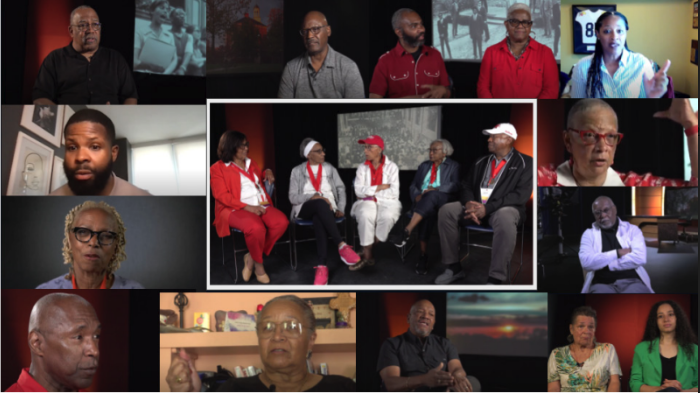
Lived Experiences Project
The year is 2020 and across campuses faculty, staff, and students alike are examining Miami’s community history and culture, asking critical questions about the experiences of people of color within the Miami community.
In the midst of these questions, a group of dedicated faculty, staff, and students came together with the idea of creating an oral history project in an effort to better showcase the lived experiences of people of color throughout Miami’s history in a vibrant and transparent way. These innovative leaders recognized the need to understand where we as a community came from to better inform our choices as we continue to move towards a more fully inclusive community. The project would go on to showcase the joys and challenges of our students, employees, and community members through what is now known as the Lived Experiences Project.
The Lived Experiences: Race at Miami Project is an oral histories project that chronicles the stories of Miami trailblazers who have impacted Miami and our community at large for the better. In recent interviews with members of the project team, our staff uncovered the scope of this project and the reach that collaborators are hoping the project has throughout the Miami community.
The project began with a funding proposal through the Boldly Creative fund in 2020, which was awarded in 2021. The proposed project was to speak about and interview people of color who attended or worked at Miami as a student, employee, or community member from the 1940s-2000s and discuss their experiences on campus. The project additionally included scholarly context and archival work conducted with the project advisory board, and a series of documentaries showcasing the findings from the project. Denise Taliaferro Baszile, Ph.D., Associate Dean for Student Services and Diversity, Professor in the Department of Educational Leadership and a lead faculty member of the project, noted in an interview with our staff that creators of the Lived Experiences Project “wanted to get current student voices in the mix” as well as previous employees and community members to showcase that “people of color go through struggles at Miami, but what makes it special is how we grow together through it.”
The Lived Experiences Project was developed by a large group of faculty and staff in collaboration with the University Libraries to create a comprehensive archive of oral histories stories of people of color who have been a part of the Miami community. Jacqueline Johnson, Archivist, Principal Librarian, and a lead member of the project, noted in her interview that the archival process included a storytelling project from the digital collection, a “Black at Miami” collection of materials, a collection from the bicentennial, and the oral history project conducted to examine Black voices at Miami. Johnson noted that they “wanted to use the archival collection to tell stories and showcase the voices of those involved.” She also noted that many individuals were involved in the process and creation of the Lived Experiences Project and that the work as a whole would not exist without the dedication of those involved.
In addition to comprehensive archival research, the project also includes a documentary showcasing the research conducted that will be premiered mid-February. Taliaferro Baszile described the documentary as “bittersweet memories about Miami from alumni,” and noted that the documentary would push viewers to consider what it means to be Black at Miami and how to think about race from a new perspective.
When asked about the goals and perceived impact of the project, Nick Kneer, Strategic Communications Coordinator for the University Libraries, explained that the project has a multi-faceted reach, one aspect of which is “providing a resource for researchers who are looking into similar themes of the project and serving as a rich repository for people of color at Miami. As people are interviewed and their stories are reviewed, themes emerge that have led to further research and deeper understanding.” Moving forward, Johnson hopes that faculty members will be able to utilize the research within their classrooms and curriculums to “further engage people to learn more about the experiences people of color have had at Miami.”
In addition to research and classroom value, Taliaferro Baszile emphasized the importance of the Lived Experiences Project adding value to the campus climate and how individuals view the Miami community. Taliaferro Baszile noted that “everyone sees through the lens of their own experience” and how this project calls for individuals to process “what it means to sit and see through others' experiences. What do we learn from sitting and listening to our peers and colleagues' experiences?” She hopes that individuals will see the value that comes from seeing Miami through a new perspective. Taliaferro Baszile, along with her project partners, looks forward to the long-term impact this project will have on the community.
While the project team is excited to launch their website that will house the full version of the Lived Experiences Project, they emphasize that there is still work to be done. Johnson explained that the archival work and documentary were phase one, and they are now building capacity to move into phase two of the project. In August, there will be a week-long workshop through Story Center and hosted by the Libraries, funded by the Oxford Community Foundation. There will be five faculty members and five community members, each making a project around the workshop and telling the stories of others. Additionally, the project team is hopeful that in the future, there will be more space to have discussions about creating curriculum about the project to encourage professors to utilize the materials in their classrooms and provide another way for people to engage with the materials.
To learn more about the Lived Experiences Project, please visit their project website. Individuals are also encouraged to view the documentary and website after the launch mid-February for more materials, information, and stories.
Lived Experiences Team: Yvette Harris, Jacqueline Johnson, Jody Perkins, Andy Rice, Seth Seward, Helen Sheumaker, Timothy Melley, Kate Rousmaniere, Steven Conn, Denise Taliaferro Baszile, Durrell Callier, and Alia Levar Wegner
Advisory Board: Yvette Harris, Jody Perkins, Denise Taliaferro Baszile, Seth Seward, Ann Elizabeth Armstrong, Curt Ellison, Kate Roumaniere, Durell Callier, Andy Rice, Linh Dich, Alia Levar Wegner, Delores Rome Hudson, Andrew Offenburger, Sanjay Puligadda, and Anika Elias
Student Assistants: Tim Bredemeier, Laurel Myers, Andy Beck, and Laura Janosik
Interviews Conducted by:Braelyn Bean (she/her), Master in Sport Leadership and Management with a Certificate in Sport Psychology, Class of 2024
Abbie Proeschel (she/her), Communications and Events Coordinator, Office of Institutional Diversity and Inclusion
Division Spotlight
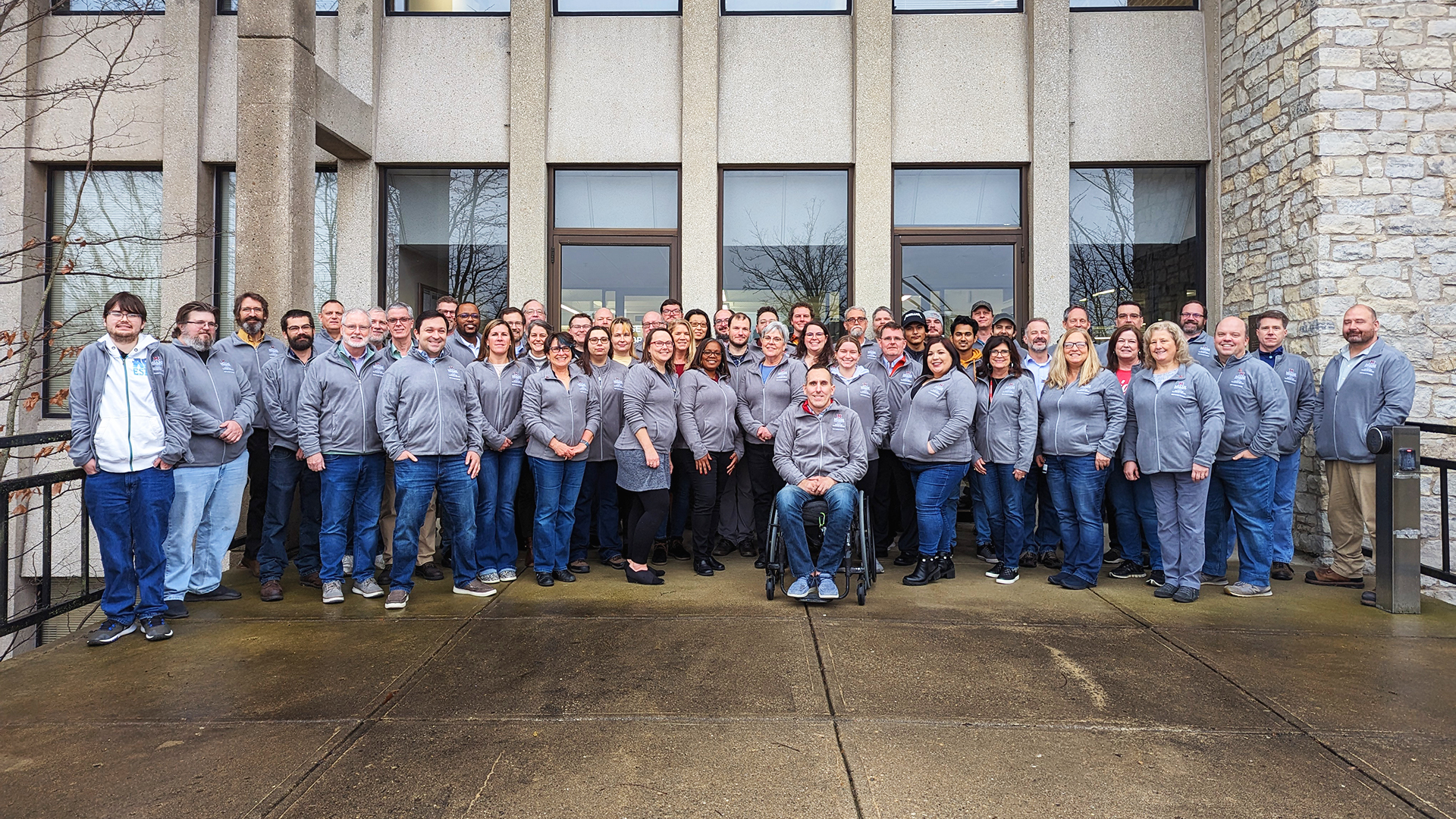
IT Services
Each year, leading technology publication ComputerWorld: The Voice of Business Technology awards its top ranked organizations with the “Best Place to Work in IT” award for the year. This award recognizes organizations in six categories: Diversity, equity and inclusion (DEI) practices; IT turnover, promotions, and growth; IT retention and engagement programs; remote/hybrid working; benefits and perks; and training and career development opportunities.
In 2023, Miami University’s IT Services was awarded the “Best Place to Work in IT” award for the second year in a row. A member of our staff met with David Seidl, VP of Information Technology and CIO, and Elizabeth Parsons, Digital Content Specialist, to discuss the award and what makes Miami’s IT Services office so unique.
When asked what strategies their office utilizes to create their specific work environment, Seidl explained that one core strategy his team utilizes is emphasizing DEI and weaving into everything that is done within the office. This includes educational events to focus on diversity and inclusion, a diversity film festival to view and learn about DEI through different films covering a range of topics, and bringing in external speakers to facilitate discussions around equity and accessibility. In discussion about their events and film festival, Seidl noted that the events allow for “a neutral and interested moderator so that we can have some of those hard conversations. We’re intentionally trying to have the hard conversations and look at those preconceptions in a place that feels safe and with an expert that can help walk us through that.”
Seidl went on to explain that within IT Services, there is a very active and dedicated DEI team, which Parsons is a part of. Parsons explained that as facilitators of the DEI events for the team, their goal is to host at least one event per quarter, including the diversity film festival. The focus of these events is to “have those difficult conversations. It can get a little awkward sometimes during those discussions, but it’s a good awkwardness. It’s an awkwardness that we are growing into.” In addition to educational events, the team is also active in opening cultural discussions to learn more about and better understand the different religious observances their team follows. Things like guides to Jewish holidays or a discussion and explanation of Diwali are common happenings with the team, and Seidl noted that everyone seemed to enjoy learning more about one another’s different cultures.
Another area of DEI integration is through the variety of services that IT offers around campus. Seidl emphasized the importance of inclusive technology, both for the office and for the Miami community. Seidl’s team has and continues to make a lot of investment into identifying and changing various forms and points of access around campus to continue to increase inclusive technology use at Miami. Examples of this expansion of forms includes the use of pronouns, updating gender fields to be more inclusive, and allowing individuals the ability to change their name effectively. Seidl noted “we’re still working on some of these, because they are not all things that we can change easily. But we made a lot of investment[s] into identifying areas for growth by building a process so people can point it out to us if something does slip through. Then we continue improving those and then bake that into our adoption process so that when we look at a new software package or application, we're asking them, do you speak the language of inclusivity? Do you understand that there's a diverse population that may be using this and it may need to be adjustable and adaptable to them?” Seidl noted that by asking these types of questions, his office is able to not only address current inequities, but also look toward the future to continue to be inclusive in the years to come.
Another large aspect of the “Best Place to Work in IT” award is career growth and opportunity. This is yet another area where Miami’s IT Services thrives. One of the things that is focused on within IT Services is opportunity. Seidl explained that their team is about creating opportunities for growth and trial periods to ensure that team members not only feel supported, but that they feel confident in their abilities. By allowing individuals to move in either direction based on their own needs, rather than pushing individuals forward towards directions that may not work for or be suited for them, Seidl and his team allow for a unique opportunity to learn and grow in a supportive environment.
Parsons expanded on this note by sharing about her own personal experiences with this unique model. “I was experiencing some trepidation, and just not feeling entirely confident in my management capabilities. And just overarching, the leadership within IT Services is very understanding. They are very supportive of career growth. And David, in particular, I expressed to him one day that I was having these issues, like, I know that you're a manager, and you've been a manager for a long time, would it be okay if we sat down and had a conversation about my worries, essentially, a mentorship kind of conversation, and he was completely open to it. Which really helped me kind of work through some of those fears that I was experiencing.” Parsons went on to note that this moment is just one small example of the type of leadership that happens within the unit, stating that collaboration is a large key within the office.
Upon receiving the “Best Places to Work in IT” award for the second year in a row, IT Services members were ecstatic. Seidl emphasized that “people were delighted, because it’s been two years in a row that we have won Best Places. This year specifically we got called out for the DEI side of it, which is so important to the organization, so it’s a point of pride and something that matters to us. We’re very invested in it.”
Receiving the Best Places award two years in a row showcases the amount of work that is being done in IT Services, but also raises the profile of the office and Miami as an institution. Miami University is the only midsize organization on the 2023 rankings, and one of only four institutions given the award overall for 2023. This is a real point of pride for Seidl and his team, and Seidl and Parsons both emphasized how proud they were to be a part of such a supportive team.
Moving forward, IT Services will continue to learn and grow in all things related to DEI. They are excited for the continued chance to develop the DEI team and learn more about expansions in inclusive technology. To learn more about the Best Places to Work in IT award, please visit CompterWorld’s webpage. To learn more about other honorifics being given in recognition of the incredible work in IT, stay tuned to IT Services, as David Seidl is currently a finalist for Ohio CIO of the Year. We wish Seidl and his team all the best and send full-hearted congratulations to their team.
Interview Conducted by: Abbie Proeschel (she/her), Communications and Events Coordinator, Office of Institutional Diversity and Inclusion
Staff Spotlight
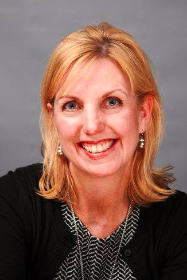
Patti Liberatore, Director, Performing Arts; Assistant Dean External Relations, College of Creative Arts
Miami University’s Center for Performing Arts is a thriving space where students and community members can experience art and culture that challenges their worldviews and encourages new perspectives to form. Patti Liberatore, Director of Performing Arts and Assistant Dean of External Relations, recently met with a member of our staff to discuss her role in the Black Arts Initiative and how diversity, equity, and inclusion (DEI) influences her role at the university.
In 2020, Liberatore’s division organized the Black Arts Initiative, which was initially virtual due to the COVID-19 pandemic, but has since expanded. Her team has partnered with a group of international artists and done workshops on anti-racism across campus for different groups of faculty and staff. The Black Arts Initiative was created to do “more around the intersection of arts and racism. We were seeing a lot of opportunity windows open. When George Floyd was murdered, we really needed to do more. At the same time, the pandemic was happening so all the artists were essentially out of work–it was unsafe to have a show.” As a result, the Black Arts Initiative was formed as a performing arts series with a foot on campus for programming and providing outreach to students, faculty, and staff.
Leading up to and in discussions of how to create the series, Patti’s team realized “that there were a lot of inherent inequities, which became a more prominent conversation because of the systems in place and how people are trying to sustain their careers as performing artists (since summer 2020). We have recently really doubled down as a performing arts series and me as a person, in trying to become more aware of previously invisible inequities.” This has taken shape in how the series is being planned, which will be hosted again April 29, 2023, and in the intentionality behind the performers that are brought into the series, like Michael Munzo’s band “Mwenso and the Shakes,” who played at family weekend in the fall of 2021, and the Electric Roots Festival hosted in the spring of 2022. Throughout the series, Liberatore’s team have included students, local and regional performers, and art exhibitions all about Black artists and issues, along with interactive activities to encourage audience members to reflect and think critically about the current issues facing Black artists.
In reflecting on her time at Miami, Liberatore has worked to incorporate DEI strategies into her daily role in a variety of ways, the Black Arts Initiative being a prime example of this. Additionally, Liberatore is proud of the work that the College of Creative Arts has done to have a DEI strategic plan for the division, along with a social justice task force, which has since turned into a divisional DEI committee. In her daily work, Liberatore focuses on “re-education and rethinking things, as well as actively looking for ways to use the arts and my position as entry points into conversations that might be more difficult to have without common ground.” Liberatore noted that it is important to always be thinking about what we as individuals can do differently and in what areas we need skill building and guidance to provide growth. Liberatore also explained that in the last couple of years there has been “a lot more concrete steps and resources created at Miami to support what I think has been a lengthier public commitment.” In alignment with university change, Liberatore’s main focus is ensuring that the changes taking place through efforts in her division are meaningful and deeply rooted to provide long-lasting, systemic changes.
One of the main strategies that Liberatore has found effective in alignment with these goals of systemic change has been the university overall having been underscoring the institutional importance of DEI issues at every level. She specifically noted that having everyone have a DEI goal in performance reviews has been particularly effective, along with having incoming employees provide a DEI statement to demonstrate their commitments to or intersections with DEI work. Liberatore noted that this requirement, along with available DEI trainings, sends a positive message to applicants about the work being done on campus to create lasting change. “Within the division what has been effective is that it was prioritized by the dean, creating the standing committee, and it is now in our governance document that we have a DEI committee that is tasked with implementing the DEI strategic plan. This made it more likely that change is sustainable because it’s part of the set of expectations.”
Moving forward, Liberatore’s vision for the growth of the Center of Performing Arts includes building upon the current divisional strategic plan and incorporating more skill building and professional development. Liberatore notes that her division has been excellent in providing representative and diverse programming in the campus and community for years and is excited for what the future holds. “I think that for the division we certainly have a reinvigorated commitment to address some of the systemic issues that get in the way of accomplishing our goals and DEI plan. I think that skill building and capacity building is going to be necessary in the short term, and through that people’s consciousness will be hopefully raised. I think that will make it much easier to change some of those structural things.” Moving forward, Liberatore hopes to see more movement and growth in recruitment and retention efforts for faculty, staff, and students, along with an examination of pedagogy in curriculum to have a more inclusive community within the College of Creative Arts. “We have been focused primarily on issues of racial equity, we know that in the last couple of years, and we want to start focusing on gender and sexuality and ability. If we stay small, it’s harder to make changes that will include pedagogy in the curriculum. We want more representation for faculty, but we also have a really small amount of majors.” Liberatore notes that moving forward, there is still work to be done, but she is hopeful at the direction of growth within the college and at the university as a whole.
Interview Conducted by: Anna Reiner (she/her), Public Health major with a concentration in Human Disease/Epidemiology, Class of 2024
Student Spotlight
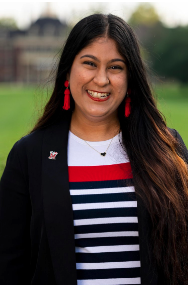
Amitoj Kaur, Student Body President
Political Science, Emerging Tech for Business Design, Class of 2023
Women of Kolour in Excellence (W.O.K.E.) co-founder
It is no secret that the students of Miami are dedicated to growth and success, and that our students challenge our campus to be a better and more equitable space for community members. One of the students leading this charge is Amitoj Kaur.
Amitoj Kaur, Student Body President, is part of the Political Science and Emerging Tech for Business and Design Class of 2023 and Co-founder of Women of Kolour in Excellence (W.O.K.E.). She recently met with a member of our staff to discuss her role with Associated Student Government (ASG) and her undertaking in the Menstrual Justice Initiative that is being launched on campus.
As student body president, Kaur has a unique perspective on the ongoings of campus. Kaur explains that within ASG, she works with the ASG Cabinet and Senate to build initiatives for the student body and work with external partners as a representative of the organization. “I represent the entire student body so my initiatives are for every student I possibly could make them for. And I usually represent the student in a lot of situations where I’m the only student present.” Alongside her cabinet and senators, Kaur is working to provide students with a voice on campus proceedings and ensure that students feel represented and heard, along with creating initiatives for students around campus.
Kaur’s platform as student body president was founded on three major areas: increasing student minimum wage, free menstrual products across campus, and creating the Nellie Craig Scholars program, “which has a new staff member in CSDI, along with 10 student employees that act as peer to peer diversity coaches for the student body.” While CSDI is currently working to hire additional staff members, this past summer, the student minimum wage increase passed. The Menstrual Justice Initiative is underway, which will allow access to menstrual hygiene products across campus at no charge.
The Menstrual Justice Initiative was a project that started during Kaur’s sophomore year on campus. At the time, she was serving on the Armstrong Student Center Board alongside Jessica Van Zastrow, who was at the time student body vice president. The project began after Kaur realized that many of the pad dispensers in the campus restrooms were older and rusted, but also required a quarter to operate, which proved to be an accessibility barrier on a cashless campus. Kaur then approached Dean Conley of the Libraries to express her frustration and concern regarding the situation, requesting a solution be found to comp the cost for students in King Library, which was the building she was in at the time. Conley suggested taking it a step further and applying the initiative across campus. “It's been three years in the works of trying to make it happen, and we finally got all of the final approvals. We've worked with the physical facilities department for all academic buildings, and then buildings that have high frequency student use. So like the Rec or Shriver, and that'll be the pilot and we're gonna see how that goes for a couple years and then hopefully expand even larger across campus.”
From Kaur’s perspective, projects like the Menstrual Justice Initiative are important for access and equity, but also open larger conversations on campus. “I think what's very unique about periods is that it is such an uncomfortable topic that no one wants to talk about why they need a pad in the middle of the day. No one wants to talk about tampons, but also, no one wants to talk about how hard it is to afford those things…But I think it'll remind students that like, it is really important to talk about the things that we are talking about.” In an effort to be more inclusive through this initiative, Kaur and her team, along with Spectrum, have worked to ensure that not only women’s restrooms will have access to menstrual products, but gender neutral restrooms as well.
For those looking to contribute or participate in the Menstrual Justice Project, Kaur encourages individuals who are able to donate to pantries and/or shelters around the Oxford community, as there is still progress to be made at large with menstrual equity. Once installation of the Menstrual Justice Initiative takes place on campus, Kaur noted awareness will be a large undertaking. “Post about it on social media. If you’re using a pad, take a picture of it and say ‘Hey, did y’all know that this is all across campus?’ I will be doing that obnoxiously the first week...I recommend students doing the same just so everyone knows because students aren’t going to be inclined to check their bathroom for free products.”
As Kaur continues in her role with ASG, she will be striving to continue to serve as an advocate for students on campus. Kaur encourages students who have an idea or concern to visit the ASG website, or email herself or a member of student government so that conversations can begin towards a solution. Follow along on ASG’s social media for updates on the Menstrual Justice Initiative and other projects taking place on campus.
Interview Conducted by: Marcella-Alysia Argüello (she/her), Psychology and Critical Race Ethnic Studies, Class of 2024
Submission for DEI Spotlight
Do you know a student, faculty member, or staff member who is doing standout diversity, equity, and inclusion (DEI) work? We are looking to highlight individuals at Miami who are doing DEI work and making an impact across our campuses or in the community at large. Our goal is to highlight DEI works around our campuses and showcase the incredible work our community is undertaking. Submit your suggestions for our next edition's spotlight!
Research Insights: Articles
Racheal Banda Rothrock, Ph.D., Visiting Assistant Professor, Department of Teaching, Curriculum, and Educational Inquiry.
Banda, R. M. & Reyes, G. (2022). Caring for students by caring for ourselves first: Comadre co-teaching during times of crisis. Teaching in Higher Education. https://doi.org/10.1080/13562517.2022.2103668
Jennifer Blue, Ph.D., Associate Dean, College of Arts and Sciences
Katemari Rosa, Jennifer Blue, Simone Hyater-Adams, Geraldine Cochran, and Chanda Prescod-Weinstein (2021) Resource Letter: RP-1: Race and Physics. American Journal of Physics 89(8), 751-768. https://doi.org/10.1119/10.0005155
Lori Chaplin, Innovation Spaces Maker; Annie Nguyen, College of Arts and Sciences Student; Jovonah Kramer, College of Engineering and Computing Student; Hayden Dutro, College of Engineering and Computing Student; and Elias Tzoc, Department Head, Create and Innovate
Chapin, L., Nguyen, A., Kramer, J., Dutro, H., & Tzoc, E. (2022). Intentional diversity in the Makerspace: A student worker hiring plan. College & Research Libraries News, 83(4), 151. doi:https://doi.org/10.5860/crln.83.4.151
Stephanie Danker, Ph.D., Associate Professor, Department of Art
Bergmark, J., & Danker, S. H. (2022). Race-based mascots: Reflecting on university-community conversations. International Journal of Education through Art, 18:1, pp. 75-88, https://doi.org/10.1386/eta_00083_1
Beth Dietz, Ph.D., Chair and Professor, Department of Social and Behavioral Sciences
Dietz, B., Bean, J., & Omaits, M. (2021). Gender differences in sport fans: A replication and extension. Journal of Sport Behavior, 44(2), 183-198. https://journalofsportbehavior.org/index.php/JSB/article/view/75
Beth Dietz, Ph.D., Chair and Professor, Department of Social and Behavioral Sciences
Dietz, B., Petonito, G., Mann. K., Oswald, B., McMahon, C.M & Linthicum, M. (2021). Pivoting during a pandemic: Creating presence for all students. Journal of Teaching and Learning with Technology, 10, 194-206. https://scholarworks.iu.edu/journals/index.php/jotlt/article/view/31376
Elliot Jardin, Ph.D., Assistant Professor, Department of Social and Behavioral Sciences
Cabin, Sasha & Jardin, Elliott. (2021). Why Preventing Ageist Attitudes Is Not Enough during COVID-19 Pandemic. Health & social work. 46. 10.1093/hsw/hlab008.
Kate Kuvalanka, Interim Chair and Professor, Department of Family Science and Social Work
Durwood, L.**, Kuvalanka, K. A., Kahn-Samuelson, S., Jordan, A., Rubin, J. D., Schnelzer, P., Devor, A. H., & Olson, K. R. (2022). Retransitioning: The experiences of youth who socially transition genders more than once. International Journal of Transgender Health, 23, 409-427. https://doi.org/10.1080/26895269.2022.2085224
Ganiva Reyes, Ph.D., Associate Professor, Department of Teaching, Curriculum, and Educational Inquiry
Wronowski, M., Aronson, B., Reyes, G., Radina, R. Batchelor, K., Banda, R., & Rind, G. (2022). Moving towards a comprehensive program of critical social justice teacher education: A QuantCrit analysis of pre-service teachers’ perceptions of social justice education. The Teacher Educator. https://doi.org/10.1080/08878730.2022.2122094
Ganiva Reyes, Ph.D., Associate Professor, Department of Teaching, Curriculum, and Educational Inquiry
Reyes, G., & Aronson, B. (2022). “It reeks of first-wave whiteness”: A reimagined critical whiteness studies and feminist of color teacher education. International Qualitative Studies in Education, 35(7), 737-743. https://doi.org/10.1080/09518398.2022.2061629
Scott Sander, Associate Clinical Professor, Department of Teaching, Curriculum, and Educational Inquiry
Sander, S., Schultz, B., Leafgren, S., & Rose, B. (2022). Getting Messy: Talking and Walking Threshold Concepts to Advance Social Justice Learning in Teacher Education and Beyond. In Changing conceptions, changing practices: Innovating teaching across disciplines. essay, Utah State University Press.
Brian Schultz, Professor and Chair, Department of Teaching, Curriculum, and Educational Inquiry
Schultz, B. D., & Pearson, P. (2021). Pedagogical pivoting, emergent curriculum, and knowledge production: But just don’t call it social justice. Journal of Curriculum Theorizing, 36(1), 10-27.https://journal.jctonline.org/index.php/jct/article/view/895
Kathleen M. Sellers, Doctoral Candidate, Department of Educational Leadership, Culture, and Curriculum
Ann Haley MacKenzie, Associate Professor, Department of Teaching, Curriculum, and Educational Inquiry, and Extraordinary Professor, Center for Self-Directed Learning, North-West University, Potchefstroom, South Africa
Sellers, K. M., & MacKenzie, A. H. (2022). Looking Back to Move Forward: Exploring Urban Secondary Education Teacher Perceptions of Culturally Relevant Pedagogy. Education and Urban Society, 0(0). https://doi.org/10.1177/00131245221121668
Sherrill Sellers, Ph.D., Associate Dean for Undergraduate Education and Professor, Department of Family Science and Social Work
Hicks, N., Sellers, S. L., Zhang, J., Sun, N., and Harris, K. 2022. What Matters Most? Intersectional Correlates of Caregiver Burden. Journal of Applied Gerontology. 41(9): 2013-2021.
Leland Spencer, Ph.D., Chair and Professor, Department of Media, Journalism, and Film, and Women’s Gender, and Sexuality Studies Program
Graves, C. G., & Spencer, L. G. (2022). Against knowing: The rhetorical structure of epistemic violence. Southern Communication Journal, 87(5), 403-417. https://doi.org/10.1080/
Research Insights: Books
M. Cristina Alcalde, Ph.D., Vice President of Institutional Diversity and Inclusion; Professor, Department of Global and Intercultural Studies
Alcalde, M. Cristina and Subramaniam, Mangala, "Dismantling Institutional Whiteness: Emerging Forms of Leadership in Higher Education" (2022). Navigating Careers in Higher Education Series. 1. Purdue University Press.https://docs.lib.
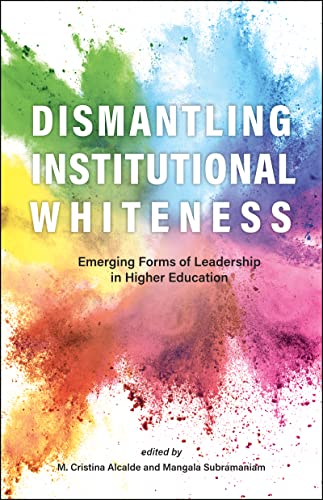
M. Cristina Alcalde, Ph.D., Vice President of Institutional Diversity and Inclusion; Professor, Department of Global and Intercultural Studies
Alcalde, M. C. (2022). Familia, exclusión y racismo de la peruanidad: la tía Eliana. Zumbayllu. Fondo Editorial Pontificia Universidad Católica del Perú. https://www.fondoeditorial.pucp.edu.pe/categorias/1330-familia-exclusion-y-racismo-de-la-peruanidad-la-tia-eliana.html

Nathaniel Bryan, Ph.D., Assistant Professor of Early Childhood Education, Department of Teaching, Curriculum, and Educational Inquiry
Bryan, N. (2021). Toward a BlackBoyCrit Pedagogy: Black boys, male teachers, and literacy early childhood classroom practices. Routledge. National Council of Teachers of English (NCTE) Research Series.https://www.routledge.com/Toward-a-BlackBoyCrit-Pedagogy-Black-Boys-Male-Teachers-and-Early-Childhood/Bryan/p/book/9780367254032

Jordan Fenton, Ph.D., Associate Professor, Department of Art.
Fenton, Jordan. Masquerade and Money in Urban Nigeria: The Case of Calabar (University of Rochester Press, 2022)
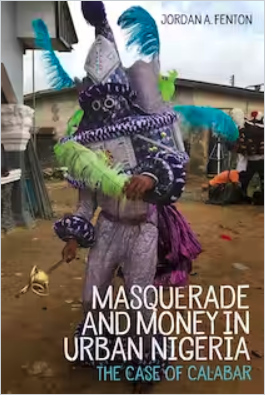
Denise McCoskey, Ph.D., Professor, Department of French, Italian, and Classical Studies.
Turda, M., McCoskey, D. E., Hahn, T., Coles, K. A., Kim, D., Hudson, N., Mogilʹner, M., & Golash-Boza, T. M. (2021). A cultural history of Race. Bloomsbury Academic. https://www.bloomsbury.com/us/cultural-history-of-race-9781350067578/

Have you recently published research or work surrounding diversity, equity, and inclusion topics? Submit your abstract and information to us to be showcased in the next newsletter’s spotlight!
Looking for your submission? We received an incredible amount of submissions for this newsletter and are proud of all of the amazing work that is being done at Miami. In an effort to better showcase publications, we will be spacing content submissions throughout the year’s newsletters to allow everyone to receive the recognition they deserve and not be lost in the shuffle.
Campus Announcements and Upcoming Events
Your Voice. Your Miami. Campus Climate Survey
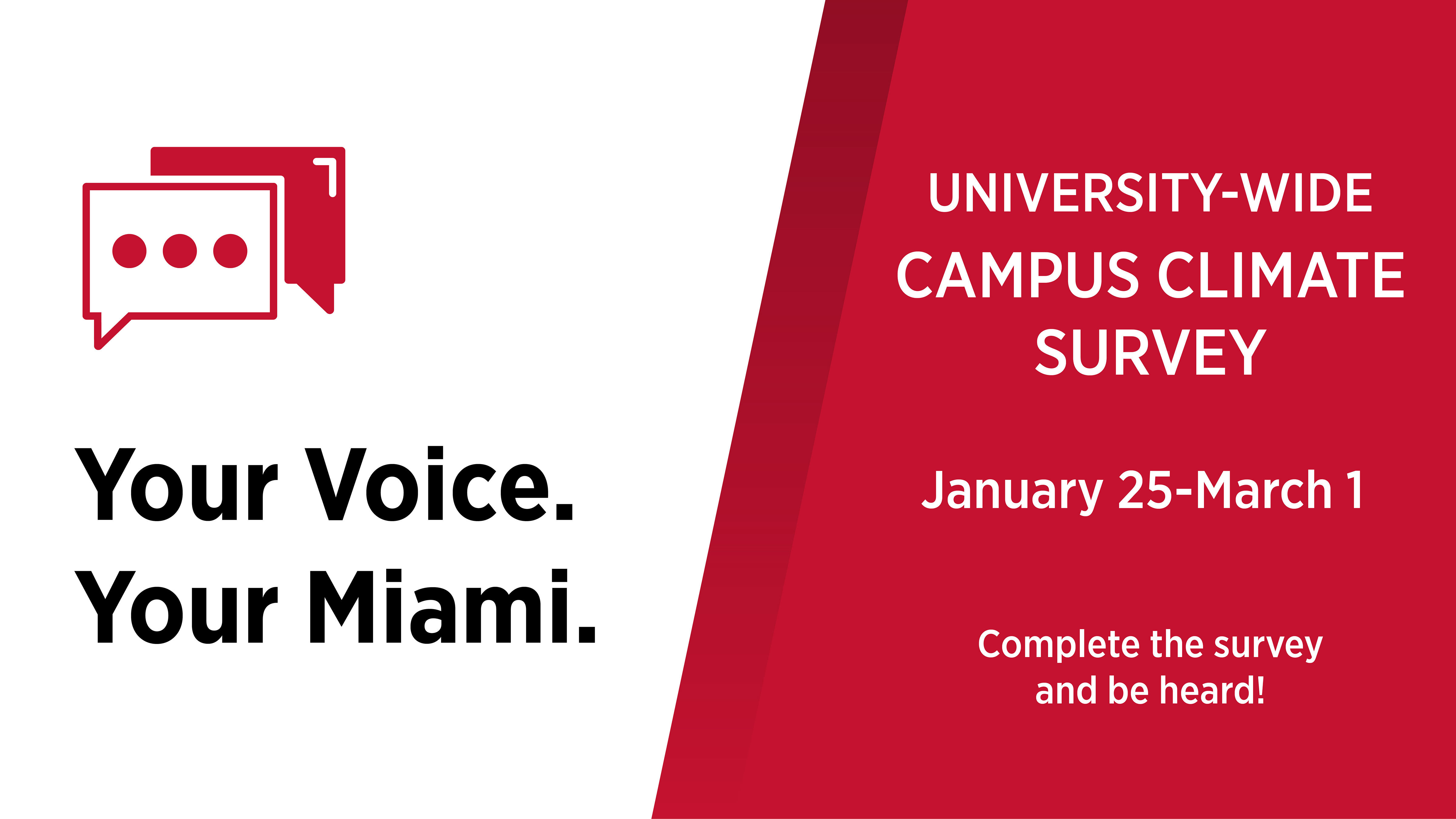
The Campus Climate Survey is live! You should have received an email with a personalized survey link to take the survey, and want to hear from you. Current students, faculty, and staff will be a part of this process and we want everyone to have a voice. At the end of the survey, you will be redirected to a new webpage to fill out information to participate in the drawing of our incentive program in which all current students, faculty, and staff are eligible to participate.
We have some exciting prizes as part of our incentive program - gift cards ($200, $50, $25), TV, bluetooth speakers, Keurigs, Miami swag, and much more. Take the survey today and get your name into our incentive program to be considered. All individuals who do the survey and fill out the incentive program form the first week, will be included in all the weekly drawings throughout the entire survey collection period. If you do the survey after the first week, you will only be in the drawing for the week you complete the survey/form.
If you have any questions about the survey, please feel free to reach out to Cristina Alcalde (she, her, hers), Vice President for Institutional Diversity and Inclusion at vpDiversity@miamioh.edu who is the Principal Investigator for the study. You can also visit our Campus Climate Survey 2023 FAQs webpage for more information.
NameCoach Access
NameCoach, a tool that helps provide pronunciation information for student, faculty, and staff names, is now available for Miami users in Canvas and online!
As colleagues, educators, friends, and learners, interpersonal communication is key for everyone at Miami. Respect and inclusion are key to ensuring an inclusive and welcoming environment, and that includes correctly pronouncing our fellow Miamians’ names. Having the tools to correctly pronounce each of our names helps promote an inclusive environment for folks of all socio-cultural identities, and NameCoach is going to help us do that.
With NameCoach, anyone at Miami can record a pronunciation for their name and share it with the community. We have integrated it directly with Canvas so that instructors can see the pronunciations of their students’ names.
There are two ways to record your name with NameCoach:
-
Record your name directly in NameCoach for your email signature, social media accounts, or professional biography
Please note: To have a pronunciation show up in Canvas, you have to record in Canvas. The direct NameCoach recording will not cross-pollinate.
Campus Pride Index
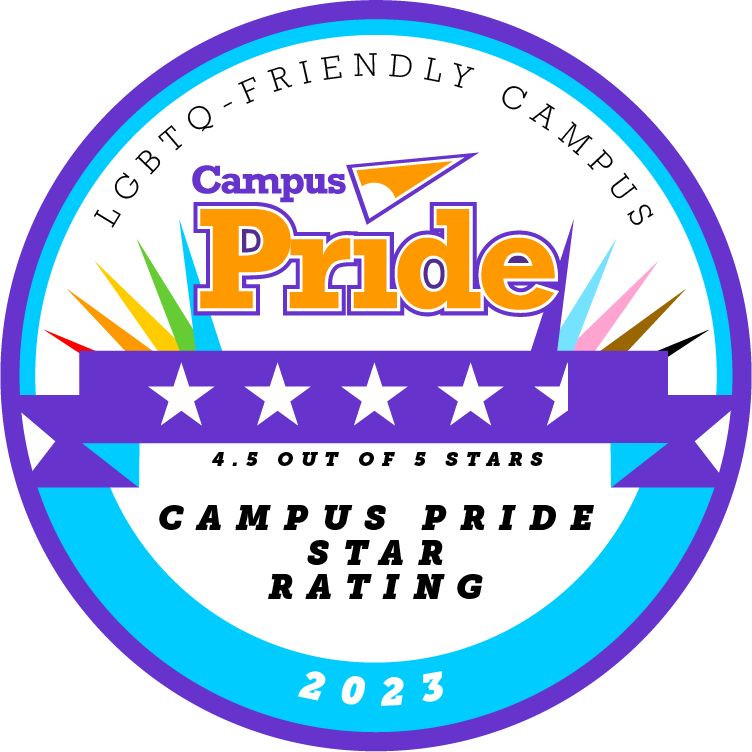
Miami University recently earned 4.5 out of 5 stars on the overall campus pride index through the national nonprofit organization Campus Pride. Campus Pride publishes a tool to help prospective students and families find LGBTQ-friendly colleges and universities.
Before this year, Miami had earned 4 out of 5 stars.
The rating is calculated based on a list of inclusion factors for both sexual orientation and gender identity and expression. Factors are broken down further into categories such as policy, commitment, academic life, student life, housing, safety, counseling and health, and recruitment and retention.
For more information, please visit the campus pride index breakdown and the Student Life News article on the rating.
Spring 2023 Book Discussion
Global Initiatives (GLI) and the Office of Institutional Diversity and Inclusion (OIDI) invite Miami staff to participate in a Spring 2023 book discussion focused on the 2020 NAFSA publication, Social Justice and International Education: Research, Practice, and Perspectives edited by Dr. LaNitra Berger. Dr. Berger is NAFSA President and Chair of the Board of Directors and Associate Professor of Art History and Director of African and African American Studies at George Mason University.
Discussion groups will take place at noon in the International Student Center (MacMillian Hall 017) on the following dates:
- January 27, 2023 (Introduction through Chapter 2)
- February 17, 2023 (Chapters 3 & 4)
- March 10, 2023 (Chapters 5 & 6)
- April 7, 2023 (Chapters 7, 8, & 9)
- April 28, 2023 (Chapters 10 & 11)
You are welcome to bring your lunch with you. We ask that those who SIGN UP and receive a copy of the book (20 copies available) please commit to participating in at least three of the five discussion sessions. If you have any questions about this program please feel free to reach out to Karla Guinigundo, Director of Global Partnerships, at guinigkm@miamioh.edu.
Words are also Migrants: Poetry as Translation of Slience
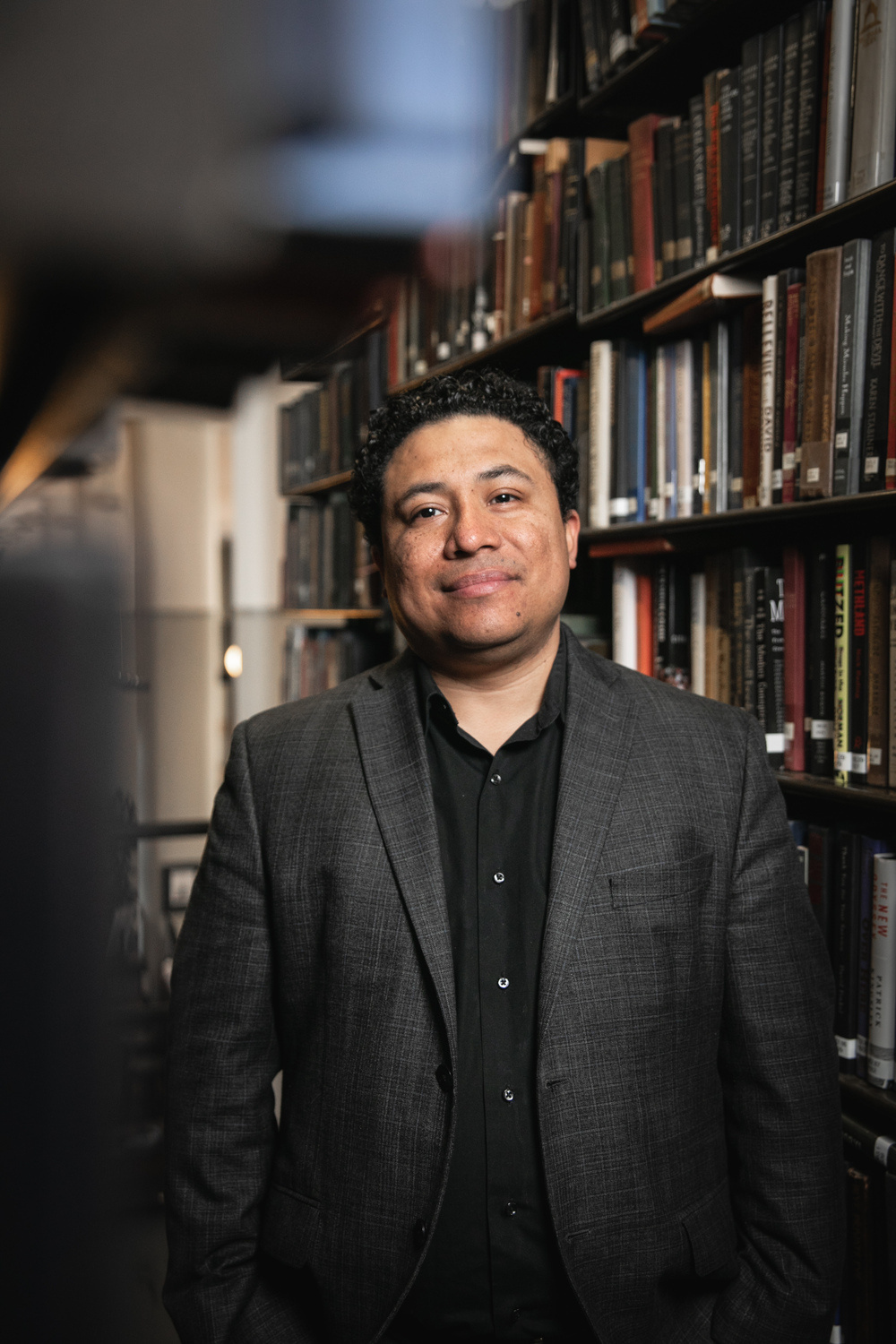
Thursday, Mar. 30, 2023|3:00 p.m. - 4:00 p.m.| Shideler Hall, 032
A creative writing workshop lead by Manuel Iris.
In this workshop, participants will discuss writing as a form of translating the silences of the human experience into words The poet is a migrant of the human experience, a translator of silences. Keeping the dignity of the stories we share and hear is part of the poetic work. Migration, translation, and creativity are the central themes of this workshop.
For more information and to register for the workshop, visit the César Chávez Day Celebration webpage.
I Am From Here: A Dialogue on Migration, Humanity, and Poetics
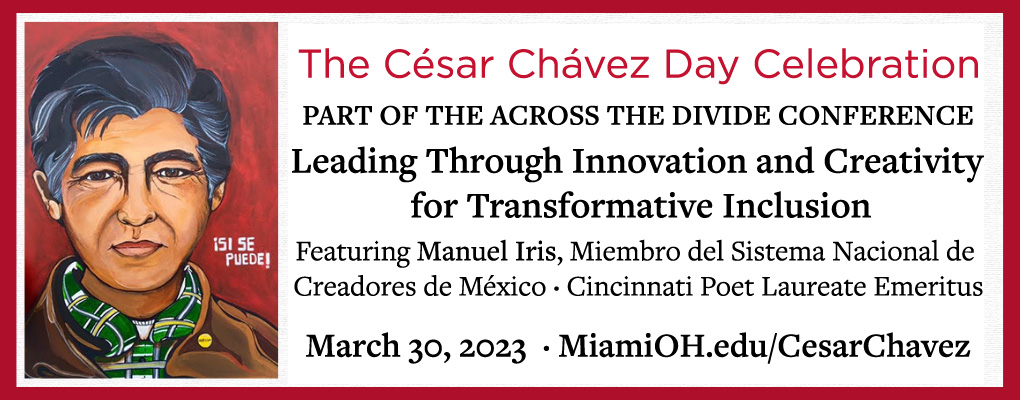
Thursday, Mar. 30, 2023|5:00 p.m. - 6:00 p.m.| McGuffey Hall, 322
Lecture and Poetry Reading by Manuel Iris. Book signing to follow at 6:00p.m.
During this presentation, Manuel Iris will talk about his writing process and the development of his identity as a mogrant poet in the U.S. He will read poems, in English and SPanish, to illustrate the link between life and poetics. After the presentation, he will engage in a conversation with the audience.
For more information about this event, visit the César Chávez Day Celebration webpage.
Cultural Resource Guide
The Office of Institutional Diversity and Inclusion is excited to share a new resource with the Miami community - Cultural Resource Guide. This guide was created to support the transition of new faculty, staff, and students to our various campuses. There are restaurants, grocery stores, community spaces, educational spaces, and mental health/wellness locations included in this guide to support a holistic introduction to our Miami community. This document is not an exhaustive list but a starting point for folks as they come into the area.
Newsletter Submissions
For more information and updates, please add the DEI events Calendar to your Google calendar. To have your event added to the calendar, please complete the newsletter submission form.
Capacity-Building and Leadership Development
Save the Date- 4th Annual Across the Divide Conference
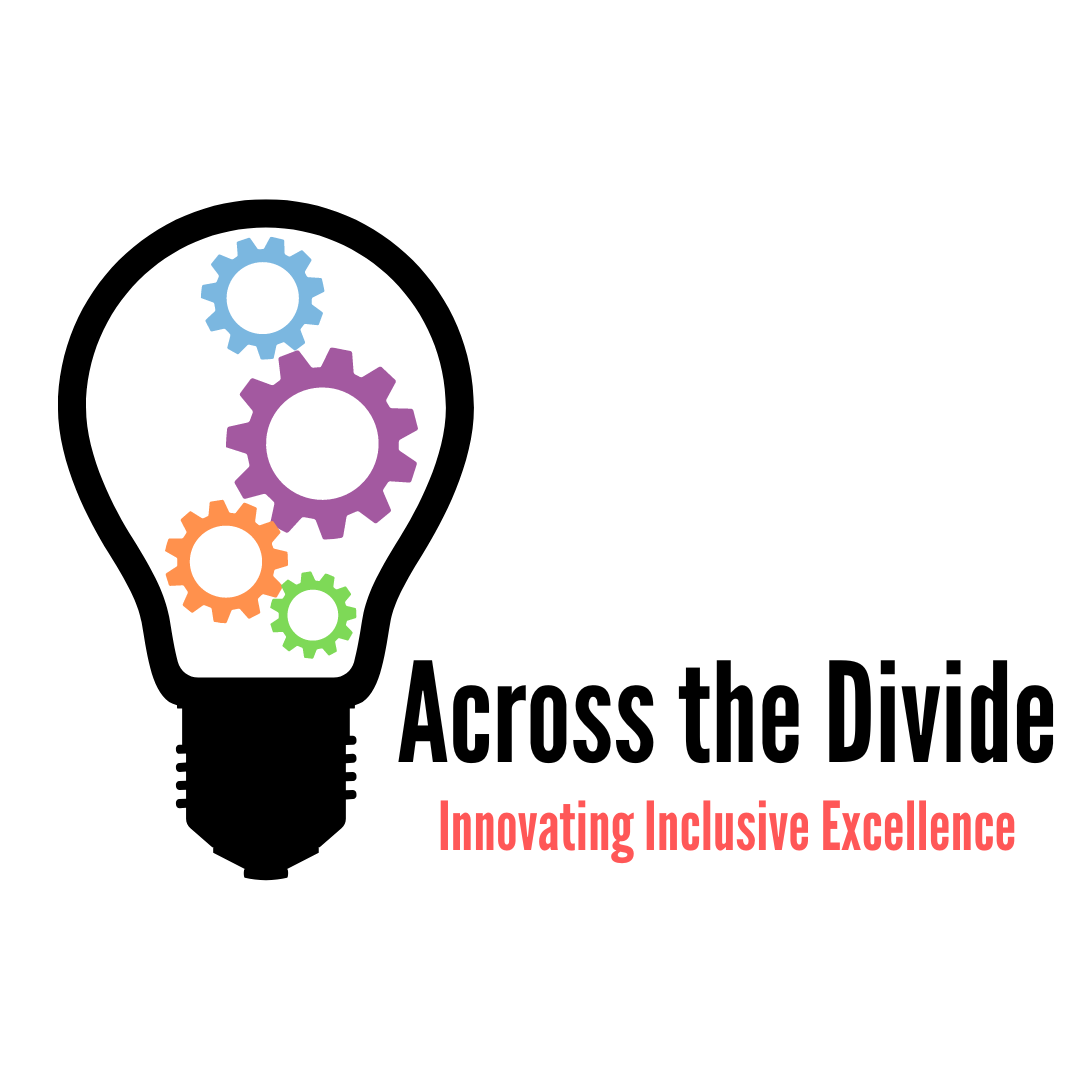
Leading through Innovation and Creativity for Transformative Inclusion
Friday, Mar. 31 | 9 am - 4 pm | The Marcum
Faculty, staff, and students are invited to participate in the 4th annual Across the Divide Conference at Miami University. This conference is the university-wide Diversity, Equity, and Inclusion conference for Miami University, with a goal to promote a deeper community understanding of the key issues and diversity initiatives across the institution. The theme for the 2023 conference will be “Leading Through Innovation and Creativity for Transformative Inclusion”. This theme allows us to explore our innovative spirit and creative outlets as forums for effective positive change in our community and celebrating diversity. Join us as we learn from each other and create together, as we work to be an ever more inclusive campus community together. Our keynote address will be made by Ron Crutcher, Miami's first African American Provost, University of Richmond President emeritus, and Miami alum, and his speech is titled - I Had No Idea You Were Black: Navigating Race on the Road to Leadership’.
Campus Climate Project - We want to hear from YOU
As part of Miami’s holistic climate study approach, OIDI is conducting stay interviews with racially minoritized faculty and staff this semester. We are still accepting sign ups from employees for the Employee Stay Interview.
We are now also launching the climate interviews with racially minoritized undergraduate and graduate students. Information from this interview initiative will be essential as we develop a DEI Strategic Plan. Complete the sign up form for the Student Climate Interview. Thank you in advance to those who participate.
Bias Incident Reporting
We invite you to visit the new Bias Reporting web page, which contains information on how to report bias incidents. The new Bias Incident reporting form includes an accessible, new format.
Focus Theme for 2022-2023: Tribal Sovereignty
Focus is a university-wide initiative to coordinate activities of many groups, centers, institutes, and departments to create a year-long exploration of an important, and timely topic from multiple disciplinary perspectives. For the 2022-2023 year, the theme is Tribal Sovereignty. To learn more about this, visit the Miami Focus Theme website.
Applications, Nominations, and Leadership Opportunities
DEI Student Advisory Council- Update
The Office of Institutional Diversity and Inclusion (OIDI) is excited to announce that we have a new group of members in our DEI Student Advisory Council. Please join us in recognizing our new council members:
- Peren Tiemann, Undergraduate student (Public Administration and Strategic Communication Major)
- Briana Jaide Collins, Undergraduate student (Individualized Studies Major; Global and Intercultural Studies Co-Major)
- Elle Scandalios, Undergraduate student (Psychology Major and Criminology Minor)
- Evelyn Morrison, Undergraduate student (Public Administration and Sustainability Major)
- August Ogunnowo, Undergraduate student (Biology, Neuroscience, Pre-Med Major)
- Nitisha Ghaley, Undergraduate student (Biochemistry Major)
This group helps maintain regular lines of communication with students (both graduate and undergraduate); to ensure students are empowered to provide regular input and recommendations related to student experiences with campus climate, new DEI-related initiatives, and DEI more broadly; and to proactively and collaboratively examine university efforts to address these concerns.
Now Open: Graduate Assistant Application
The Office for Institutional Diversity and Inclusion (OIDI) seeks a Graduate Assistant for 2023-2024 to join efforts to advance university-wide diversity, equity, and inclusion (DEI) strategic planning, programming, and initiatives. This Graduate Assistantship will complement and enhance the experience of a graduate program by providing practical and professionalization experience in institutional DEI work and research, working closely with the staff and joining other student team members. The Graduate Assistant will be an integral part of OIDI as part of a team working on DEI strategies, initiatives, and capacity-building efforts. Graduate students from any graduate program are eligible to apply.
An initial review of applications will be conducted early March. Those interested are encouraged to complete an application. Any inquiries about this opportunity can be directed to OIDI@miamioh.edu.
2023 University Diversity and Inclusion Awards - Nominations Open
The Office of Institutional Diversity and Inclusion is excited to announce the opening of our University Diversity and Inclusion Awards nominations. We have six categories this year to honor and uplift the great work being done across our campuses by individuals, groups and units across the institution. Award Nominations are due by Friday, March 10th by 5 pm and a description of each award can be found below:
Ray of Light Award: This award recognizes faculty and staff of the Miami University community who have demonstrated, advanced, or promoted activities, programs, or actions that have supported campus efforts to help enrich the experiences of faculty, staff, and students.
Diversity and Inclusion Student Advocate Award - Undergraduate: This award recognizes a current undergraduate student who has worked tirelessly on campus and/or the local community to advance diversity, equity, and inclusion. This could have been accomplished through programming, policy, community building, and/or other initiatives to support Miami University’s commitment to an inclusive campus community.
Diversity and Inclusion Student Advocate Award - Graduate: This award recognizes a current graduate student who has worked tirelessly on campus and/or the local community to advance diversity, equity, and inclusion. This could have been accomplished through programming, policy, community building, and/or other initiatives to support Miami University’s commitment to an inclusive campus community.
Distinguished DEI Service Award: This award recognizes the creative/academic contributions of a unit (including departments or offices) steeped in a consistent record of service that has highlighted or supported diversity and inclusion, as well as directly shaped and positively impacted the meaning and understanding of diversity and inclusion on campus. This award considers efforts by the unit over the past two years.
Diversity Event of the Year Award: This award recognizes an individual (faculty, staff, or student) or group who hosted an event or series that engaged the campus community in a meaningful diversity and inclusion experience. The event should have been a collaborative effort with various campus stakeholders to extend the scope and impact of the event on campus. Events that have taken place from Spring 2022 to the deadline of the nomination cycle are eligible for this award.
Institutional Inclusive Excellence Award: This signature award is the premier award at Miami University that recognizes trailblazers on campus who have led or impacted policy changes, innovative programming, and/or demonstrated scholarly contributions to diversity, equity, and inclusion. This individual's leadership has inspired transformative change which not only meets Miami’s commitment to inclusive excellence but amplifies this mission through their extensive commitment to this work.
Religious Observances and Inclusive Scheduling
As we begin the spring semester, the Office of Institutional Diversity and Inclusion (OIDI) encourages all Miami community members to consult the full list of Religious Observances and Inclusive Scheduling dates on our website. Below we highlight a few key religious holidays and observances, including a description of the holiday, best practices, and customary greetings to support our active investment in fostering an inclusive campus community. Please note that these are not all of the holidays that are taking place in the spring semester, nor is this a fully inclusive list.
March 6-7* - Purim (Judaism)
- Description: Purim celebrates the survival of Jewish people who were marked for death by Persian rulers. It celebrates how they were saved by Esther. Many celebrate Purim by retelling the story of Purim, attending feasts, and going to carnivals. The day prior to Purim is a fasting day from sunrise to sunset. This means no food, and no water during that time.
- Best Practices: Please consider the practice of fasting when scheduling any events, “lunch meetings,” or scheduling lengthy presentations. Not all will fast or take time off, but they may still observe in various ways.
- Customary Greetings: “Happy Purim” or "Chag Sameach" (Khahg sa-MAY-ach)
March 22-April 21* - Ramadan (Islam)
- Description: Ramadan is considered one of the holiest months of the year for Muslims. It is widely considered the month in which the Qur’an was first revealed. Fasting in the month of Ramadan is one of the “five pillars” of Islam. Practicing Muslims who are able to do so are expected to fast from sunrise to sunset every day of the month. This means no food, and no water during that time. At the end of Ramadan, Muslims celebrate one of their major holidays called Eid al-Fitr (April 21-22*) or the “Festival of the Breaking of the Fast.”
- Best Practices: Please consider the practice of fasting and focus of the month when scheduling any events, “lunch meetings,” or scheduling lengthy presentations. Not all Muslims will fast or take time off, but they may still observe in various ways.
- Customary Greetings: "Ramadan Mubarak" (MOO-bah-ROK) or "Happy Ramadan"
April 7 - Good Friday (Christian)
- Description: Good Friday commemorates the day that Jesus was crucified and died. It is considered a day of mourning, and is a part of holy week. Even though it is a sad day, it is called Good Friday because it led to the victory over death and sin. Many services are held around midday which is the same hours that Jesus was hung on the cross. Good Friday is an obligatory day of fasting and abstinence for Catholics.
- Best Practices: Please consider the practice of fasting when scheduling any events, “lunch meetings,” or scheduling lengthy presentations. Not all Christians will fast or take time off, but they may still observe in various ways.
- Customary Greetings: There is no traditional greeting for this day, as it is a somber holiday typically associated with reflection and mourning.
April 5-13 - Passover (Judaism)
- Description: Passover celebrates the Biblical story of Exodus, when the Israelites were freed from their slavery in Egypt. Passover is "prescribed" in the Book of Exodus in the Old Testament. Passover is celebrated with a big ceremony. On the first night, a special family meal called seder is held. The seder foods symbolize the Jewish liberation. People also recite traditional prayers. During Passover, Jews eat unleavened bread for seven days. On the first and last night of Passover, people may want to take off work. They are considered sacred occasions when one is not to work at their occupations. Festive meals take place during the holiday.
- Best Practices: Please consider the celebrations of Passover when scheduling any events or scheduling lengthy presentations. Not all practicing Jews will take time off, but they may still observe in various ways.
- Customary Greetings: “Happy Passover” or “Chag Sameach” (Chahg Sa-MAY-Ach)
April 9 - Easter (Christian)
- Description: Easter celebrates the belief in the resurrection of Jesus Christ. Three days after his crucifixion, he resurrected. For many Christians, Easter is positive because it is the end of the Lent season of fasting and penitence. Christians worldwide attend an Easter mass with special services, music, flowers, and ringing of church bells. The Easter Eggs symbolize rebirth and fertility. In countries around the world, people hold Easter egg hunts, egg decorating events, or just giving them as gifts. Traditional Catholics sometimes continue the Good Friday fast until the Easter Vigil.
- Best Practices: Please consider the practice of fasting when scheduling any events, “lunch meetings,” or scheduling lengthy presentations. Not all Christians will fast or take time off, but they may still observe in various ways.
- Customary Greetings: “Happy Easter” or “Christ is Risen” with the reply “He is Risen Indeed”
Note: “*” denotes holidays that start sundown the day before. Please note that individual practices may vary.
We also encourage the use of our Religious Observances and Inclusive Scheduling calendar to provide guidance and help avoid scheduling important events, activities, and deadlines on holidays observed by members of the Miami community. Should you or a member of your team have any questions or concerns on how to best utilize this information or on appropriate accommodations, please contact the Office of Institutional Diversity and Inclusion or the Office of Equity and Equal Opportunity.
Call for Submissions
If you have any Miami updates or relevant information that you would like to have included in the next edition, please complete the newsletter submission form.

